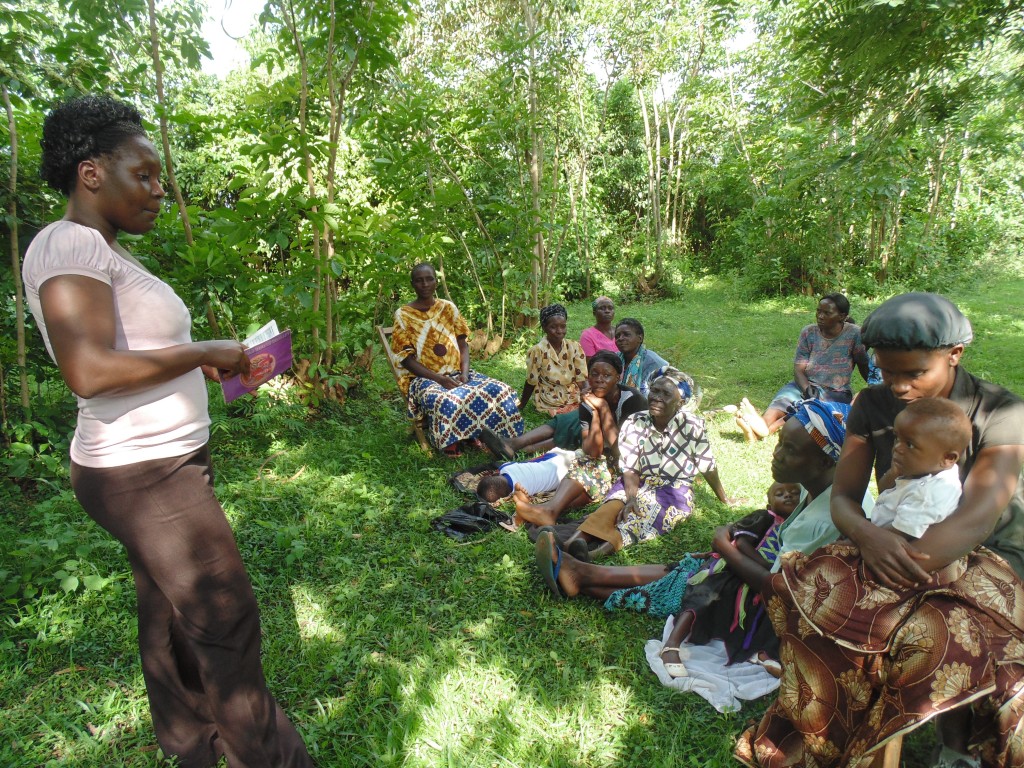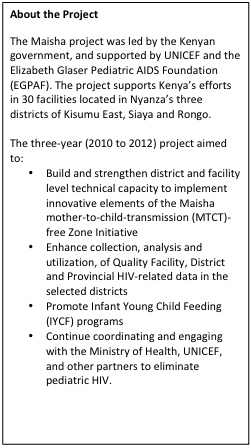Teaching New Mothers Living with HIV about the Importance of Breast-feeding

By Eric Kilongi, Elisabeth Glaser Pediatric AIDS Foundation
Note: This post originally appeared in the Elizabeth Glaser Pediatric AIDS Foundation's Blog.
Though HIV can be transmitted from mother to child through breast milk, studies have shown that women living with HIV are less likely to pass the virus if they breast-feed their babies exclusively for at least four months. Breast milk contains nutrients and essential antibodies that can help babies fend off dangerous infections.
 A Kamrembo breastfeeding and infant feeding support group meeting in progress. Courtesy EGPAF.
A Kamrembo breastfeeding and infant feeding support group meeting in progress. Courtesy EGPAF.
At Kamrembo village in Ukwala district in Kenya, a community-driven infant and young child feeding program associated with the Maisha project – supported by the Elizabeth Glaser Pediatric AIDS Foundation (EGPAF) – is shattering myths associated with exclusive breast-feeding and helping more mothers feed their babies.
As part of this effort, community health workers started a support group to promote exclusive breast-feeding as a way to reduce mother-to-child transmission (MTCT) and improve overall child health and nutrition.
“Breast-feeding is less expensive, readily available, and we do not have to carry flasks with us all the time to keep milk warm,” said a support group participant.
“Children who are exclusively breast-fed have more body weight and rarely fall sick,” said another support group member during a session on the benefits of exclusive breast-feeding.
Nutritionists participate in support group meetings, offering advice and tips to help women breast-feed effectively.
“You often find you are more comfortable breast-feeding the child on one breast as opposed to the other, right”? asked Leah Ejakait, a nutritionist with the Maisha Project.
“Yes!” the women responded in unison.
“You need to find a comfortable position to breast-feed the baby long enough on both breasts”, Leah said. “Not breast-feeding the child long enough on one breast causes milk to accumulate, blocking the duct and resulting in swelling of the breast and irritation of nerves.”
The women nodded in agreement. They had learned how to deal with one important impediment.
This group of 15 women has been meeting faithfully every month since Nov. 2012, with the support of Community Health Extension Workers (CHEW) from the Ukwala health center.
“The meetings take place within their village and are designed to be short, so they do not interrupt their daily schedules,” said Catherine Odumbe, who oversees community activities at Ukwala Health Centre CHEW.
The support group is focused on dispelling beliefs about breast-feeding that hinder women’s efforts to support their children. These myths include concerns that breast milk is inadequate and necessitates additional nutrition. But breast milk is much better for infants, especially in rural or remote regions where mixing formula with contaminated water could be dangerous.
 “Most of the diarrheal cases among infants, especially in rural areas, are a result of poor handling of (food) other than the mother’s breast milk,” said Odumbe. “That is why we insist that mothers feed their infants on breast milk only until (the baby’s) immunity develops.”
“Most of the diarrheal cases among infants, especially in rural areas, are a result of poor handling of (food) other than the mother’s breast milk,” said Odumbe. “That is why we insist that mothers feed their infants on breast milk only until (the baby’s) immunity develops.”
Caroline Anyango, who became a community health worker (CHW) at Ukwala Health Centre in 2006, is the chair and founder of this group. For the past six months, she has promoted exclusive breast-feeding among women who visit the clinic at Ukwala.
When Caroline attended an Infant and Young Child Feeding training in Ugenya, she decided to lead and train other women in the community about exclusive breast-feeding and proper feeding practices to help children grow up healthy.
A mother of three older children and one infant, Caroline has witnessed first-hand the benefits of exclusive breast-feeding.
“I started exclusive breast-feeding with my (youngest) in 2006 when I became a CHW, and the difference is phenomenal,” she said.
The Ukwala Health Centre CHEW would like to start another support group for pregnant women to help them improve antenatal care (ANC) attendance and encourage them to choose a hospital delivery over at-home delivery.
To learn more about EGPAF's work in Kenya, visit their Kenya country profile page.
